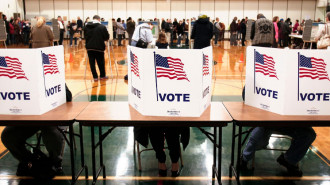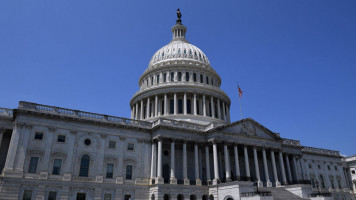Majority of Palestinians want Abbas to resign, poll finds
A majority of Palestinians want President Mahmoud Abbas to resign while over half of the Palestinian public fear publicly criticising the Palestinian Authority, a new poll has found.
The survey was carried out across the West Bank and Gaza Strip from September 14 to 16 by the Palestinian Center for Policy and Survey Research (PSR) and published this week.
The PSR's findings reveal that a majority of Palestinians in the occupied territories are worried about the future of civil liberties amid a crackdown on activists and journalists, including a new Cyber Crimes Law introduced in August which targets online dissent.
Sixty-seven percent of Palestinians demand Abbas' resignation, according to the poll, with the figure standing at 80 percent in the Gaza Strip.
Thirty-five percent of Palestinians would want to see jailed Fatah leader Marwan Barghouti replace Abbas as president if he did not nominate himself in a new election, while 21 percent would prefer Hamas leader Ismail Haniyeh.
Mohammad Dahlan polled in third at nine percent.
Abbas, whose presidential term expired in January 2009, has no plans to step down and has ignored calls to appoint a successor.
If legislative elections were held today with all political parties participating, 36 percent say they would vote for Fatah while 29 percent say they would choose Hamas.
Ten percent would vote for third parties while 25 percent said they were undecided, the PSR poll found.
The majority of Palestinians, 61 percent, are pessimistic about recent efforts for Palestinian reconciliation, while 57 percent believe a two-state solution is no longer viable.
Last week, Hamas said it had dissolved its administration that runs the Gaza Strip and is willing to hold general elections to form a unity government.
The announcement accepted key demands set by Abbas for ending the Fatah-Hamas split.
US President Donald Trump last month dispatched a delegation of top US envoys to the Middle East to discuss Israeli-Palestinian peace talks, which have been frozen since talks collapsed in 2014.

![Palestinians mourned the victims of an Israeli strike on Deir al-Balah [Getty]](/sites/default/files/styles/image_684x385/public/2024-11/GettyImages-2182362043.jpg?h=199d8c1f&itok=xSHZFbmc)


![The law could be enforced against teachers without prior notice [Getty]](/sites/default/files/styles/image_684x385/public/2178740715.jpeg?h=a5f2f23a&itok=hnqrCS4x)
 Follow the Middle East's top stories in English at The New Arab on Google News
Follow the Middle East's top stories in English at The New Arab on Google News


